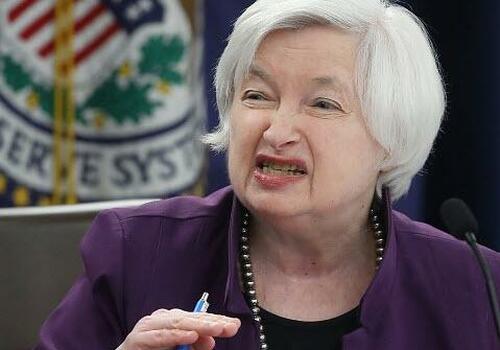Economics
Hedge Fund CIO: In Times Like These, Markets Push Prices To The Point Of Maximum Policymaker Pain
Hedge Fund CIO: In Times Like These, Markets Push Prices To The Point Of Maximum Policymaker Pain
By Eric Peters, CIO of One River Asset Management
“I…

Hedge Fund CIO: In Times Like These, Markets Push Prices To The Point Of Maximum Policymaker Pain
By Eric Peters, CIO of One River Asset Management
“I have not considered or discussed anything having to do with blanket insurance or guarantees of all deposits,” answered Janet Yellen, when asked on Wednesday whether Treasury would circumvent Congress to insure all deposits.
Naturally, this accelerated the bank run, as rational economic actors moved their money.
“Certainly, we would be prepared to take additional actions if warranted,” said Yellen on Thursday, attempting to reverse Wednesday’s damage.
And this made it more likely that additional action will become warranted. Because in times like these, markets sniff out weakness, and push prices to the point of maximum pain. Policymaker panic.
“In such an environment, our ultimate goal is clear: we must – and we will – bring down inflation to our medium-term target in a timely manner,” declared Christine Lagarde, determined, schooled in the importance of conveying confidence during times of crisis.
“In current conditions, a robust strategy calls for a data-dependent approach to making policy and a clear reaction function so that the public understands the sources of information that will be important to us,” continued the ECB President.
“To that end, our future policy path will be determined by three factors; (1) our assessment of the inflation outlook in light of the incoming economic and financial data, (2) the dynamics of underlying inflation, and (3) the strength of monetary policy transmission,” explained Lagarde.
It all sounded great to just about everyone, except investors, and especially traders.
Because (1) a central bank’s inflation outlook in times of great economic uncertainty is profoundly unreliable, (2) the dynamics of underlying inflation are wildly unstable when inflation is this high, and (3) monetary policy transmission in a highly indebted hyper-financialized global economy can appear too weak one day and precipitate a bank run the next.
“At the same time, I have made clear that there is no trade-off between price stability and financial stability. We have plenty of tools to provide liquidity support to the financial system if needed and to preserve the smooth transmission of monetary policy,” said Lagarde, presumably hoping that if she said it with great certainty, we would all forget the lessons of decades of trading and a century of financial history.
You see, central banks do not have the power to determine how monetary policy is transmitted. Markets decide. And there is always a trade-off that central banks must make between price stability and financial stability. To deny this is to invite markets to press our policy makers to the point where they must choose one or the other.
Tyler Durden
Mon, 03/27/2023 – 06:30
inflation
monetary
markets
policy
central bank
monetary policy

Argentina Is One of the Most Regulated Countries in the World
In the coming days and weeks, we can expect further, far‐reaching reform proposals that will go through the Argentine congress.
Crypto, Crude, & Crap Stocks Rally As Yield Curve Steepens, Rate-Cut Hopes Soar
Crypto, Crude, & Crap Stocks Rally As Yield Curve Steepens, Rate-Cut Hopes Soar
A weird week of macro data – strong jobless claims but…
Fed Pivot: A Blend of Confidence and Folly
Fed Pivot: Charting a New Course in Economic Strategy Dec 22, 2023 Introduction In the dynamic world of economics, the Federal Reserve, the central bank…





















